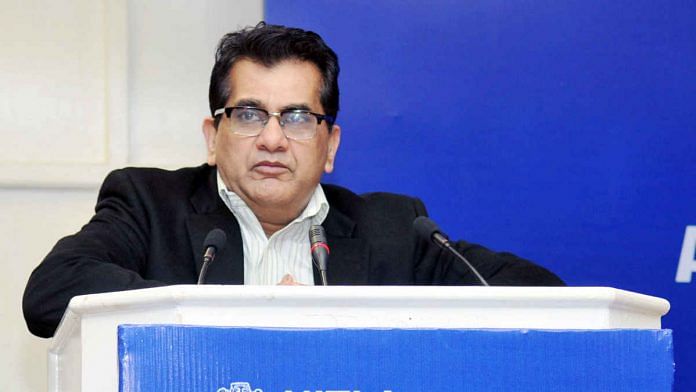New Delhi: A digital revolution has completely transformed financial inclusion in India, NITI Aayog CEO Amitabh Kant said Thursday during a special address at the Carnegie Global Summit 2020.
“With close to 700 million connections, India has the largest broadband users in the world. There are about 696 million Indians using smartphones now. India has the largest data usage per smartphone at an average of 9.8 GB per month,” Kant said in his opening remarks, giving a quick peek into the scale of digitisation in India.
This availability of mobile data has happened at the cheapest cost, he added. “We are the largest consumer of data in the world, and our data costs are the lowest—almost 1/20th of the cost of data in the USA, and 1/10th compared to the cost of data compared to the United Kingdom,” he said.
JAM trinity
“We are also the only country in the world with over a billion-plus biometrics, a billion-plus mobiles, and also a billion-plus bank accounts — what we term as the JAM (Jan Dhan-Aadhaar-Mobile) trinity,” Kant said, calling the JAM trinity “the bedrock of financial inclusion in India”.
The average account balance in Jan Dhan accounts has risen to Rs 3,400, he said. Coupled with the possession of Aadhaar cards and mobile phones by Indians, this has been a massive boost for digital transformations for Indians, Kant said, adding that this has also been an extremely effective means of service delivery as more and more government schemes are being availed through Direct Benefit Transfer (DBT).
The Unified Payment Interface (UPI) crossed the 2 billion transaction mark in October 2020, he said, adding that it’s not only the transactions through UPI that have increased but their values have also gone up by over a 100 per cent in the last one year.
“The digital-first mindset of a country of over 1.3 billion people is not only a technological advancement, but more importantly, it is a foundation for a new mechanism for the deliverance of public goods,” Kant said. “In reality, the JAM has allowed the unbanked and the under-banked access to financial services over their phones, allowing them to for the first time, contribute to India’s formal as well as digital economy.”
Instead of physically going to banks, Indians now have the access to banks in the palm of their hands, thereby changing the landscape of digital financing in the country, he added.
ThePrint is a digital partner with Carnegie India for the Global Technology Summit 2020.
Also read: UPI’s rapid growth proves India can build world-class payments infrastructure from scratch



